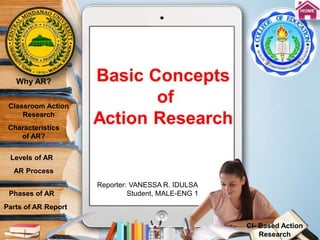
Action research report idulsa, vanessa (EDUC 241)
- 1. Reporter: VANESSA R. IDULSA Student, MALE-ENG 1 Why AR? Classroom Action Research AR Process Parts of AR Report CI- Based Action Research Phases of AR Characteristics of AR? Levels of AR
- 5. Why AR? AR gives educators new opportunities to reflect on and assess their teaching; To explore and test new ideas, methods, and materials; To assess how effective the new approaches were; To share feedback with fellow team members; To make decisions about which new approaches to include in the practice.
- 6. When do you use action research? 1. To solve an educational problem; 2. To help educators reflect on their own practices 3. To address school-wide problems 4. When teachers want to improve their practices
- 15. The Action Research Process Taken from ASCD (Sagor, 2000) 1. Selecting a focus 2. Clarifying theories 3. Identifying research questions 4. Collecting data and Analyzing data 5. Reporting results 6. Taking informed action
- 16. The Phases of Action Research Selecting a focus begins with the teacher researcher or the team of action researchers asking: What element(s) of our practice or what aspect of student learning do we wish to investigate? Step 1- Selecting a Focus
- 17. Some areas for investigation in Action Research: Low student participation in class activities Irregular attendance/tardiness in class Students negative attitude towards Mathematics and Science Low motivation of pupils to perform in the test Non accomplishment of homework, assignment, or projects. Students’ unruly behaviour Students’ learning in a group work Step 1—Selecting a Focus
- 18. Some Variables Affecting Student Learning Gender, race, and/or ethnicity Prior knowledge and experiences Age Socioeconomic status First language Learning styles Peer relationships Intellectual strengths–multiple intelligences Self-concept Motivation
- 21. School Variables
- 22. Selected instructional strategies (Kelly and Kelly, 2013)
- 23. This involves identifying the values, beliefs, and theoretical perspectives the researchers hold relating to their focus. • Conduct search of literature reviews for the theory needed. • Example of theories: – Self-determination theory – Social cognitive theory – Zone of Proximal Development Step 2- Clarifying Theories
- 24. • Generate a set of personally meaningful research questions to guide the inquiry. • Be specific with the independent, dependent, mediating, moderating, and dependent variables (outcomes). Step 3- Identifying Research Questions
- 29. In order to build a complete picture of learners’ learning abilities, data should be gathered from any sources of information. In research terminology, the process of collecting multiple sources of data for every problem or issue being studied is called triangulation. (Sagor 1992) Step 4- Collecting and Analyzing Data
- 30. Examples of classroom data collection tools include but not limited to: • Observation (checklists, anecdotal records, charts/grid), interviews and conversations, learners’ work, grades, reports cards, cumulative records and test, experiment, survey, Focus Group Discussions (FGD) Step 4- Collecting and Analyzing Data
- 32. Collecting and Analyzing Data • Quantitative • Qualitative • Both quantitative and qualitative
- 33. Collecting and Analyzing Data Quantitative Analysis Sources of information: Survey, questionnaires, rating scales, checklists, formative and summative assessments, standardized tests – Testing hypothesis Relationship of variables Comparing categories on a dependent variable Effect of an IV on a DV – Use descriptive and inferential statistics
- 34. Collecting and Analyzing Data Qualitative data analysis – Sources: interview transcripts, observational notes, journal entries, audio and video transcription, records, reports
- 35. Step 5- Reporting Results faculty meetings teacher conferences writing up the work for publication or reports
- 36. Step 6- Taking Informed Action Create an action plan description of the implementation of a new education practice. Alternative approaches to addressing the problem Plan to share the findings to colleagues
- 37. Parts of the Action Research Report 1. Title 2. Abstract (not more than 200 words) 3. Introduction ( including statement of the problem, scope and delimitation, significance, definition of terms ) 4. Brief review of literature (conceptual/theoretical framework) 5. Methodology and Research Design 6. Results and Discussion 7. Conclusions 8. References
- 38. Continuous Improvement- Based Action Research It is an on-going effort to improve products, services or processes. These efforts can seek “incremental” improvement overtime or ‘breakthrough” improvement all at once.
- 42. 10 Coping Strategies Jean McNiff, Action Research, Principles and Practice, McNiff,1988, 144-145 1. Don't Give Up 2. Enlist the Help of Colleagues 3. Keep a Positive Attitude 4. Be Prepared to Compromise 5. Be Generous 6. Go Public 7. Join a Local Action Research Group 8. Establish a Reputation for Success 9. Publish Reports in Journals 10. Have Faith in Your Own Knowledge.
- 43. 10 Guidelines for Teachers Fullan and Hargreaves (1991), quoted in Change Forces, Fullan, 1993, 144 1) Locate, listen to and articulate your inner voice 2) Practice reflection in action, on action, and about action. 3) Develop a risk-taking mentality. 4) Trust processes as well as people. 5) Appreciate the total person in working with others. 6) Commit to working with colleagues. 7) Redefine your role to extend beyond the classroom. 8) Push and support principals and other administrators to develop interactive professionalism. 9) Commit to continuous improvement and perpetual learning. 10)Monitor and strengthen the connection between your development and students' development
- 44. Acknowledgement: Credits to Dr. James L. Paglinawan, CMU College Secretary for allowing the reporter to download and adapt his PowerPoint presentation entitled ‘Action Research: A Review of the Basic Concepts’ from slideshare.com Australian-AID PAHRODF, Overview of the CIP PowerPoint Presentation